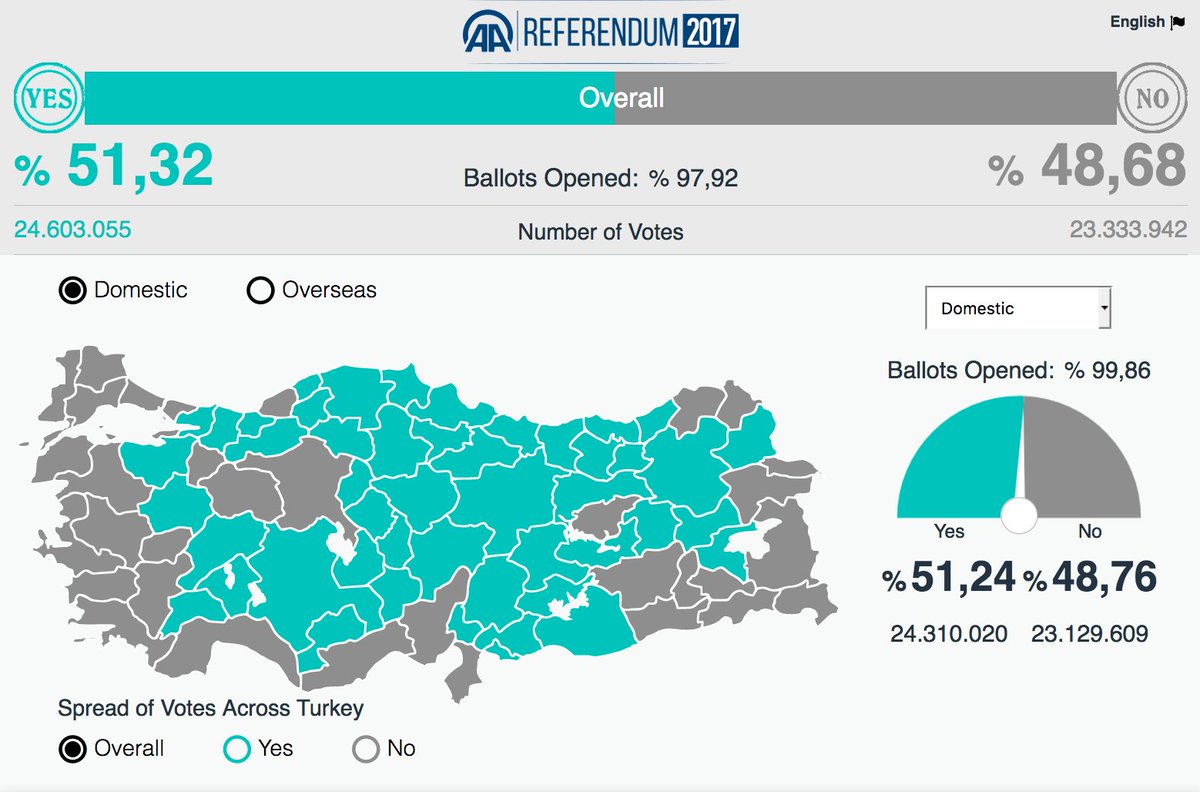Erdogan-2029? 'Yes’ vote winning in Turkey's referendum to expand president’s powers

RT,
16
April, 2017
President
Recep Tayyip Erdogan has declared victory in the referendum on
Turkey’s constitutional reform package. With most of the ballots
opened, over 51 percent of voters have supported expanding the powers
of president.
The head of Turkey’s Electoral Board has confirmed the result of the referendum, saying the “yes” vote has won.
The
final results of the plebiscite on amending the constitution to
significantly expand the country’s presidential powers are to be
announced in 11 or 12 days, he said.
Erdogan
said that unofficial results of the plebiscite showed that around 25
million people said ‘yes’ to the constitutional amendments,
beating the ‘no’ vote by 1.3 million.
He
called the ‘yes’ vote a historic decision by the Turkish people,
expressing hope that it will benefit the country.
"Turkey
for the first time in its history has decided with the will of the
parliament and its people on such an important change. For the first
time in the history of the Republic, we are changing our ruling
system through civil politics. That is why it is very significant,”
he said.
Turks
living abroad have played a major part in the success of the
referendum, which will pave the way for one of the most important
reforms in the country’s history, Erdogan said.
The
President also addressed the international community, saying that
everyone should respect the decision of the Turkish people,
especially those countries which call themselves Ankara’s allies.
Erdogan
said he will “immediately” discuss the issue of restoring the
death penalty with the Prime Minister and the leader of the
Nationalist Movement Party. Erdogan said the step is necessary to
punish the plotters of the failed coup last summer.
Earlier,
Turkish Prime Minister Binali Yildirim also said that the unofficial
ballot count showed that the ‘yes’ vote was ahead.
According
to the PM, Turkey was opening a new page in its democratic history
with this plebiscite result.
Striking
a conciliatory tone, he said authorities viewed those, who voted “no”
on Sunday, the same as those who supported the expansion of
presidential powers.
Yildirim
also said he will now be making the necessary preparations for the
presidential election to take place in Turkey in 2019.
Around
98% of ballots have been counted, Turkey's state-run Anadolu news
agency says adding that the "yes'' votes are leading with
51.32%. The lead has narrowed to three points.
The
leader of Nationalist Movement Party, Devlet Bahceli, who supported
the constitutional amendments declared victory in the referendum.
Bahceli
hailed the “yes” vote as “a very important success; a win that
makes neglect and denial impossible.”
He
also praised the Turkish people for withstanding “pressure,
blackmail, imposition, force, and threats by the whole world” to
make the right choice.
Polls
closed at 4:00pm (13:00 GMT) in the east of the country, and 5:00pm
elsewhere. The referendum, in which 55 million people eligible to
vote, saw a high turnout of 86 percent, Haberturk broadcaster
reported.
Despite
the "yes" vote leading in total, the support for
constitutional amendments was far from overwhelming in some regions
of the country.
Less
than 33 percent supported the expansion of Erdogan’s powers in the
mainly Kurdish province of Diyarbakır, with the "no" vote
standing at 67 percent, Anadolu agency reported after 90 percent of
the ballots were counted. Similar moods were reported in the Izmir
province.
The
“no” vote is leading in the Turkish capital, Ankara, where 51.6
percent rejected constitutional amendments after 80 percent of the
ballot counted, according to CNN Turk. Istanbul also looks to have
rejected the reform.
#Turkey #referendum2017 unofficial overall results
YES: 51.32%
NO: 48.68%
Ballots opened: 97.92%
http://aa.com.tr/en
The
Anadolu agency released unofficial results of the vote in Germany,
where around 4 million Turkish citizens reside. Nearly 63 percent of
German-Turks apparently voted ‘yes’ in the referendum, which led
to a rift in relations between Ankara and Europe.
Erdogan
blasted the EU as “Nazi” and “fascist” after Germany, the
Netherlands, and Austria banned rallies organized by Turkey to
promote the plebiscite or in some cases prevented Turkish ministers
from appearing at the events.
Turks
living abroad cast their ballots on April 9, but their results will
be released on Sunday along with those of the voters inside Turkey.
Election
Board to count ballots without official seal
Turkey's
Supreme Election Board said on Sunday that it had made an
“unprecedented” decision to deem valid and count the ballots that
didn’t bear the board's official seal, AP and Reuters reported. The
move was explained by the fact that many voters complained that they
were handed ballots without the official stamp in the referendum.
In
order for the ballot to be considered invalid it has to be proven
that it was cast fraudulently, the board added.
The
Turkish opposition refused to accept the results of the referendum,
saying it’s going to demand a recount of a large part of the votes.
“Since
this morning, we have determined some 2.5 million problematic votes,”
Erdal Aksunger, Republic People's Party (CHP) spokesman said, adding
that 37-60 percent of the ballots might need a recount.
The
pro-Kurdish Peoples' Democratic Party (HDP) said it’s going to
object to two-thirds of the vote.
“Our
data indicates a manipulation in the range of 3 to 4 percent,” HDP
wrote on Twitter.
The
referendum mostly passed off in a calm atmosphere, with the exception
of a few incidents. In Diyarbakir Province, three people were killed
outside a polling station, as two of the local clans clashed over
political differences.
In
Istanbul, it was reported that a crowd verbally attacked an
opposition journalist for speaking out against the expansion of
presidential powers.
The
“Yes” vote will potentially see the current parliamentary system
in Turkey replaced by an executive presidency by 18 constitutional
changes, representing the most drastic reform in the country’s
governance since the modern republic’s foundation in early 1920s.
Among
other things, the new powers would allow Erdogan to issue decrees,
declare emergency rule, appoint ministers and state officials as well
as dissolve the parliament. He could also potentially stay in power
until 2029, while the prime minister’s position would be abolished.
The
Turkish leader has been persistent in his claims that the
parliamentary system prevents good governance in Turkey by pitting
the president against the PM.
He
argued that the changes to the constitution are paramount at the
moment for him to restore order in the country after the failed coup
attempt in summer, which Ankara blames on religious figure Fethullah
Gulen, who is now in exile in the US.


























No comments:
Post a Comment
Note: only a member of this blog may post a comment.